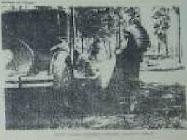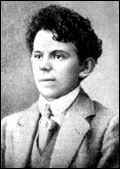Am reading fine book by J. Stephen Russell, Chaucer & the Trivium (along with trying to read original Canterbury Tales).
Russell analyzes the differences between modern & medieval thinking. He talks about the influence, on the medievals' sense of language, of a dual, hierarchical culture (Latin & vernacular). & of the importance of systematic, Aristotelian logic : the 10 defining "categories" of a thing, & their adaptation to medieval school-learning (by Boethius, Porphyry, others). Here's a quote :
"What emerges from this dense enumeration is a pair of distinctions. First, of course, are species, genera, and individuals, material that was amplified in [Porphyry's] Isagogue. Second is the distinction between 'of' and 'in', that between necessary (essential) attributes and accidental ones.
"This second distinction is, with only a bit of overdramatization, the cornerstone of medieval philosophy, the taxonomy that held (and, some would say, still holds) the world together." (Russell, p. 35)
The difference between of (what can be said of a thing) and in (what is integral to the identity or substance of - definitive of - a thing). Substances and accidents - how important this concept was to the Middle Ages is indicated by these lines of Dante's final vision, at the end of the Divina Commedia (Paradiso 33) :
I saw that in its depth far down is lying
Bound up with love together in one volume,
What through the universe in leaves is scattered;
Substance, and accident, and their operations,
All interfused together in such wise
That what I speak of is one simple light.
Today hybrid cars are all the rage (focusing our attention on the species "automobile", to the neglect of the genus [mass] "transportation"), as well as hybrid poetry (see the Norton anthology American Hybrid - a politic fusion of "old & new") & hybrid art forms (or product diversification) of all kinds...
I wonder if there's a way to recuperate this distinction (between "of" & "in") for poetry criticism. Today the "impure" holds the positive valence, whereas the "pure" is under suspicion (logocentrism, racial "purity", essentialism, etc.). But the political manipulation of racial hatreds, for example, could be analyzed as a version of logical category-confusion (ie. the "purity of the (German, white, black, take your pick) race" posits a substantial aspect (race) for what is in truth an accident (race is an accidental aspect of the genus human being). & the proposition of "hybrid" poetries - ie. Ron Silliman : "there is no such thing as poetry, there are only kinds of poetry" (I'm quoting from memory) - referring to such things as, I guess, slam, post-avant, "SOQ", elliptical, neo-objectivism, Slow Poetry, Investigative Poetics, conceptual, flarf, etc. etc. - might also be a kind of category-confusion. Cui bono? Who benefits? Is it possible that these hybrid forms offer a sort of brand diversification, a way simultaneously to make inroads in, & to maintain (or re-vivify), the academic industry of teaching poetry-writing? & in the pursuit of "accidental" qualities, are we obscuring (or denying) poetry's more basic, integral substance?
8.14.2009
Subscribe to:
Post Comments (Atom)



1 comment:
a good start, certainly.
such as: some think the line-ending inessential to poetry, others do not.
genres nowadays, being defined by which idols one subscribes to.
m.
Post a Comment